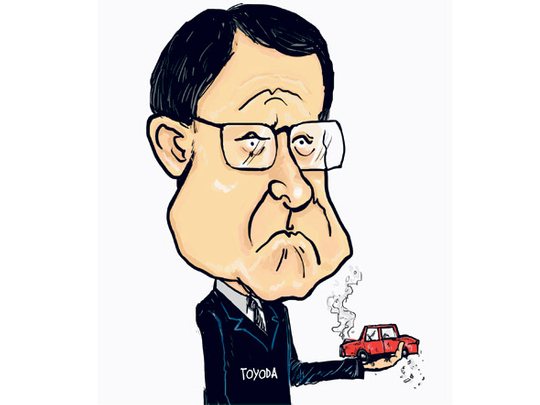
It's not every day that Ben Bernanke is overshadowed on Capitol Hill. Toyota Motor's president managed that feat last week.
After the Federal Reserve chairman appeared before Congress to give his semiannual testimony on the US economy, lawmakers slapped Akio Toyoda around for three hours, and for good reason. The biggest automaker was slow and clueless in its safety-crisis response. Incompetence turned a recall into a global scandal.
While I watched Toyoda take blow after blow from angry US lawmakers, a thought kept running through my head: The company's stock is a glaring buy. The shares have fallen almost 16 per cent this year to 3,270 yen.
No doubt, the fabled Toyota is a mess, a corporate "Black Swan" like few the modern world has seen. A year ago, it was zooming along reasonably well even as economies crashed. While General Motors was put on government life support, Toyota was plotting a future for itself.
Hubris accompanied Toyota's headlong drive to be No 1. It compromised the quality and safety that made its reputation. An arrogant and non-transparent crisis response further tarnished trust. Toyota must work hard to regain it.
It will, though, and that's just the point. If Toyota executives didn't understand the magnitude of their troubles a month ago, they do now. When Toyoda promised "a redoubled focus on putting our customers first" in Washington last week, I for one believed him.
And the pressure is on — really on. This story is as much about politics as business. Before Toyoda appeared before Congress, Prime Minister Yukio Hatoyama was giving him pointers in the media. Hatoyama is concerned that Toyota could cause an economic rift between the US and Japan.
The image of Japan Inc hangs in the balance, and inaction is no longer an option. Nor is perpetuating the canard that the "Toyota Way" is flawless. It's broken and the company is, like it or not, getting the memo.
By putting profit ahead of safety, Toyota lost its way — not its future. The question is no longer about what Toyota did, or failed to do. It's about what it will do next week, next month and next year to right itself.
Any bet on Toyota is a long-term one. Recalls tend to lead to more. Yet Toyota is miles ahead of the competitors when it comes to the fuel-efficient, environmentally friendly cars that consumers want, like the Prius. Innovation is its thing. Can we really count out Toyota five or 10 years from now?
Cheap shares
The shares are cheap. Toyota's market value has lost the equivalent of Kenya's annual gross domestic product — about $35 billion — since January 21, when it recalled about 2.3 million vehicles in the US to fix sticking accelerator pedals.
Toyoda's day in Congress made for painful watching on cultural grounds. Japan's corporate leaders abhor confrontation and avoid the spotlight; America's tend to live for both. Politicians, too. These differences collided as angry partisans tried to force details out of a Japanese executive steeped in a tradition of saving face and maintaining "wa", or harmony.
To Japanese, Toyoda saying "I sincerely regret" what has happened is an act that should ease tensions. To folks in Washington, it looks more like the kind of obfuscation they might expect from Fed Chairman Bernanke.
Perception divide
The perception divide is clear in the media. The US is going after Toyota as if shenanigans at Enron and American International Group never happened. In Japan, the coverage has taken on a more conspiratorial tone. Many sense that Toyota- bashing is code for Japan-bashing.
It looks bad for a government in the auto business to go after a company so connected with national pride as Toyota. One wonders if the House Committee on Oversight and Government Reform is cleaning up the US financial system with similar zeal. And where were regulators when Toyota's troubles arose?
The situation became surreal for me when radio host Rush Limbaugh criticised US Transportation Secretary Ray LaHood for behaving like "one of the brand managers" for GM and Chrysler Group, "running around ripping Toyota to shreds". It's rare that I agree with anything that comes out of Limbaugh's mouth. This time was different.
Much is getting lost in translation. Toyota is no longer just a Japanese company. About 200,000 people in America make their living from it. Twenty-five years ago, US workers took bats to foreign-made cars. "Buy American" slogans and Bruce Springsteen's anthems ruled.
These days, the governors of US states with Toyota plants are writing to lawmakers to complain about the federal government's "disturbing statements and hasty actions" toward Toyota. A simple us-versus-them battle this is not.
Perhaps it's telling that Bernanke got upstaged. At a time when US voters are concerned about bubbles past and present, their leaders are helping inflate a new one in negativity toward Toyota. This bubble may be shorter lived than many think.












